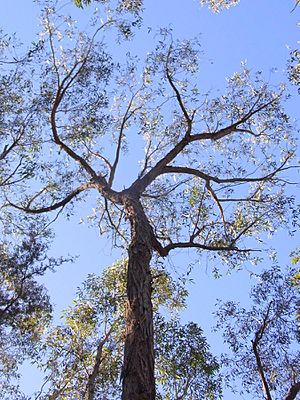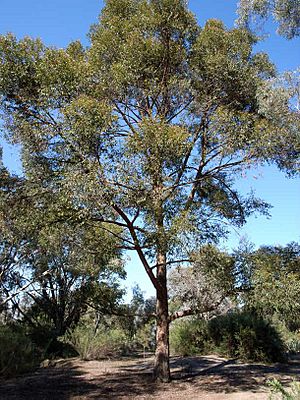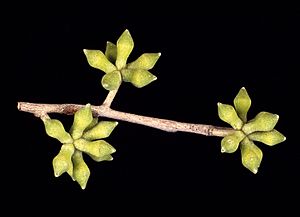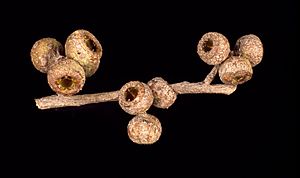Thin-leaved stringybark facts for kids
Quick facts for kids Thin-leaved stringybark |
|
|---|---|
 |
|
| Blue Mountains National Park, Australia | |
| Scientific classification |
|
| Kingdom: | Plantae |
| Clade: | Tracheophytes |
| Clade: | Angiosperms |
| Clade: | Eudicots |
| Clade: | Rosids |
| Order: | Myrtales |
| Family: | Myrtaceae |
| Genus: | Eucalyptus |
| Species: |
E. eugenioides
|
| Binomial name | |
| Eucalyptus eugenioides Sieber ex Spreng.
|
|
| Script error: The function "autoWithCaption" does not exist. | |
| Synonyms | |
|
List
Eucalyptus acervula Sieber ex DC.
Eucalyptus eugeniodes Sieber ex Spreng. orth. var. Eucalyptus eugenioides Sieber ex Spreng. var. eugenioides Eucalyptus laevopinea var. minor R.T.Baker Eucalyptus nigra R.T.Baker Eucalyptus wiburdi Blakely orth. var. Eucalyptus wiburdii Blakely Eucalyptus wilkinsoniana R.T.Baker Eucalyptus wilkinsoniana var. crassifructa Blakely Eucalyptus wilkinsoniana R.T.Baker var. wilkinsoniana |
|
Script error: No such module "Check for conflicting parameters".
The Eucalyptus eugenioides, also known as the thin-leaved stringybark or white stringybark, is a type of tree found only in eastern Australia. It is a small to medium-sized tree. It has rough, stringy bark and special leaves shaped like a spear. Its flowers are white and grow in groups. The tree also produces small, round fruits.

Contents
What Does the Thin-Leaved Stringybark Look Like?
The thin-leaved stringybark tree usually grows to be about 25 to 30 meters (82 to 98 feet) tall. Its trunk can be around 70 centimeters (28 inches) wide. It has rough bark that looks like strings and is grey to reddish in color.
Young trees have leaves that are egg-shaped or spear-shaped. These leaves are about 45 to 80 millimeters (1.8 to 3.1 inches) long. They are shiny green on top and lighter underneath.
Older trees have leaves that are shiny green on both sides. They are also spear-shaped but can be a bit curved. These leaves are longer, about 70 to 160 millimeters (2.8 to 6.3 inches) long.
Flowers and Fruit
The tree's flower buds grow in groups of nine to fifteen. They are found where the leaves meet the stem. Each group of buds is on a stalk about 5 to 17 millimeters (0.2 to 0.7 inches) long.
When the buds are ready, they are green to yellow and shaped like an oval or a spindle. They are about 6 to 8 millimeters (0.2 to 0.3 inches) long. The flowers bloom from July to January.
After flowering, the tree produces woody fruits. These fruits are shaped like a half-sphere or a flattened ball. They are about 4 to 6 millimeters (0.16 to 0.24 inches) long and 6 to 10 millimeters (0.24 to 0.39 inches) wide.
How the Thin-Leaved Stringybark Got Its Name
The Eucalyptus eugenioides was first officially described in 1827. This was done by a scientist named Kurt Sprengel. He used notes from another scientist, Franz Sieber.
The name "eugenioides" comes from the word Eugenia. This means the tree was thought to look similar to trees in the Eugenia group. The common name "stringybark" describes its bark. The bark has long, thin fibers that can be pulled off like strings.
Where Does the Thin-Leaved Stringybark Grow?
This tree is found across eastern New South Wales in Australia. It grows from a town called Wyndham up to Warwick in southeastern Queensland. You can also find some groups of these trees further north, near Gladstone.
It likes to grow in areas with moderately fertile soil. This soil often comes from shale and slate rocks. You can find it in open forests on lowlands and small hills.
What Trees Grow With It?
The thin-leaved stringybark often grows with other types of trees. These include:
- Grey box (E. moluccana)
- Forest red gum (E. tereticornis)
- Cabbage gum (E. amplifolia)
- Manna gum (E. viminalis)
- Woollybutt (E. longifolia)
- Narrow-leaved ironbark (E. crebra)
- Argyle apple (E. cinerea)
- Spotted gum (Corymbia maculata)
It also grows with paperbark trees like prickly paperbark (Melaleuca styphelioides) and white feather honeymyrtle (M. decora). The thin-leaved stringybark is a very important tree in the Cumberland Plain Woodlands, which is a special type of forest.
Life Cycle and Ecology
The thin-leaved stringybark is very good at regrowing after a bushfire. It can sprout new shoots from special buds under its bark. These trees can live for more than a hundred years!
An insect called the longhorn beetle (Adrium artifex) has been seen living on the thin-leaved stringybark.
Uses and Cultivation
People have grown Eucalyptus eugenioides in California, USA. It grows best there in areas near the coast.
In New South Wales, beekeepers call it "good kind stringybark." This is because bees that feed on its flowers are healthy. The honey they make from this tree has a good balance of nutrients. It also provides the last important source of pollen for bees before winter arrives.
See also
 In Spanish: Eucalyptus eugenioides para niños
In Spanish: Eucalyptus eugenioides para niños
 | James Van Der Zee |
 | Alma Thomas |
 | Ellis Wilson |
 | Margaret Taylor-Burroughs |



